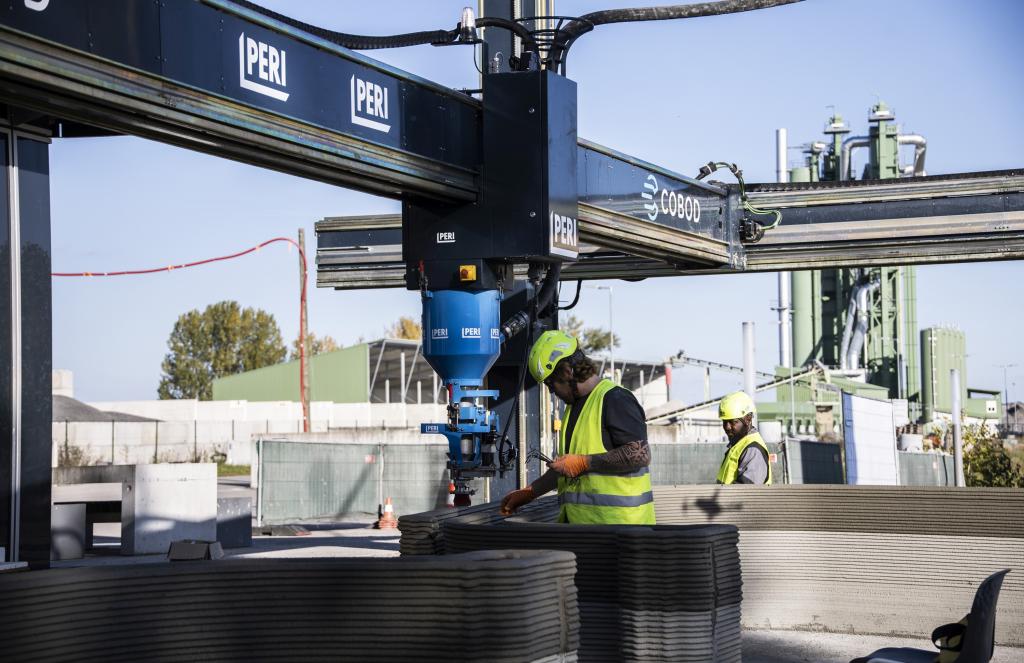Thessaloniki gets ready for its metro launch in November
The underground rapid transit lines have been under construction for almost two decades due to various project delays
 TheMayor.EU logo
TheMayor.EU logo 
The printer creates two parallel concrete walls with a cavity, that can be filled with insulation, Source: STRABAG/PERI
The construction phase of the new building was completed in 45 hours
On 28 October, the construction of the first 3D printed building in Austria began in the town of Haulstein. The new building was completed in 45 hours by the developer ‘Peri’, a company with experience in 3D printed buildings, with a few projects in Germany. The structure is an addition to the headquarters of the Austrian construction firm ‘Strabag’.
In the past, new architectural ideas usually came through the adoption of new materials and new construction methods. This was the case with the original Bauhaus movement, which came about because of improved steel and concrete technology, enabling developers to build higher and lighter structures.
According to representatives of ‘Peri’, this could change with the wider adoption of 3D printed buildings. The vertical position of the printer head allows architects to use rounded shapes, as the machine pours up to one metre of concrete per second. It also layers the material gradually, adding a very specific texture to both the exterior and the interior.
The lightning-fast construction process of the building, 45 hours, stirs up quite an excitement for the future. Specialists uploaded the construction plan into the printer software, to break it down into manageable chunks.
At the same time, the machine could not produce the building in one single go, and construction workers were on-site to install pipes, electrical wires, windows, etc. This is why the CEO of ‘Strabag’, Thomas Birthel, thinks that it is unlikely 3D printed construction will take away jobs from the industry.
In fact, he sees it as a way to make construction more efficient and more exciting for newer generations, with the added digitalisation. According to him, the printer offers a possibility to counteract specific labour shortages in the more manual fields of construction.
He was quoted in a press release, saying: "3D printing is currently only suitable for construction projects up to a certain size, so well-trained skilled workers remain crucial for the successful implementation of construction projects. Furthermore, 3D concrete printing provides an important innovation impulse for the construction industry and is an exciting addition to other construction methods.”

The underground rapid transit lines have been under construction for almost two decades due to various project delays

Now you can get your wine in Talence by paying directly in Bitcoin

That’s because the state has to spend money on updating the railway infrastructure rather than subsidizing the cost of the popular pass

Rethinking renewable energy sources for the urban landscape

The examples, compiled by Beyond Fossil Fuels, can inform and inspire communities and entrepreneurs that still feel trepidation at the prospect of energy transition

Now you can get your wine in Talence by paying directly in Bitcoin

The 10th European Conference on Sustainable Cities and Towns (ESCT) sets the stage for stronger cooperation between the EU, national and local level to fast track Europe's transition to climate neutrality.

At least, that’s the promise made by the mayor of Paris, Anne Hidalgo

The underground rapid transit lines have been under construction for almost two decades due to various project delays

At least, that’s the promise made by the mayor of Paris, Anne Hidalgo

Hostal de Pinós is located in the geographical centre of the autonomous region

Despite its church-y name, the district has long been known as the hangout spot for the artsy crowds

Urban dwellers across the EU are having a say in making their surroundings friendlier to people and the environment.

Forests in the EU can help green the European construction industry and bolster a continent-wide push for architectural improvements.

Apply by 10 November and do your part for the transformation of European public spaces

An interview with the Mayor of a Polish city that seeks to reinvent itself

An interview with the newly elected ICLEI President and Mayor of Malmö

A conversation with the Mayor of Lisbon about the spirit and dimensions of innovation present in the Portuguese capital














